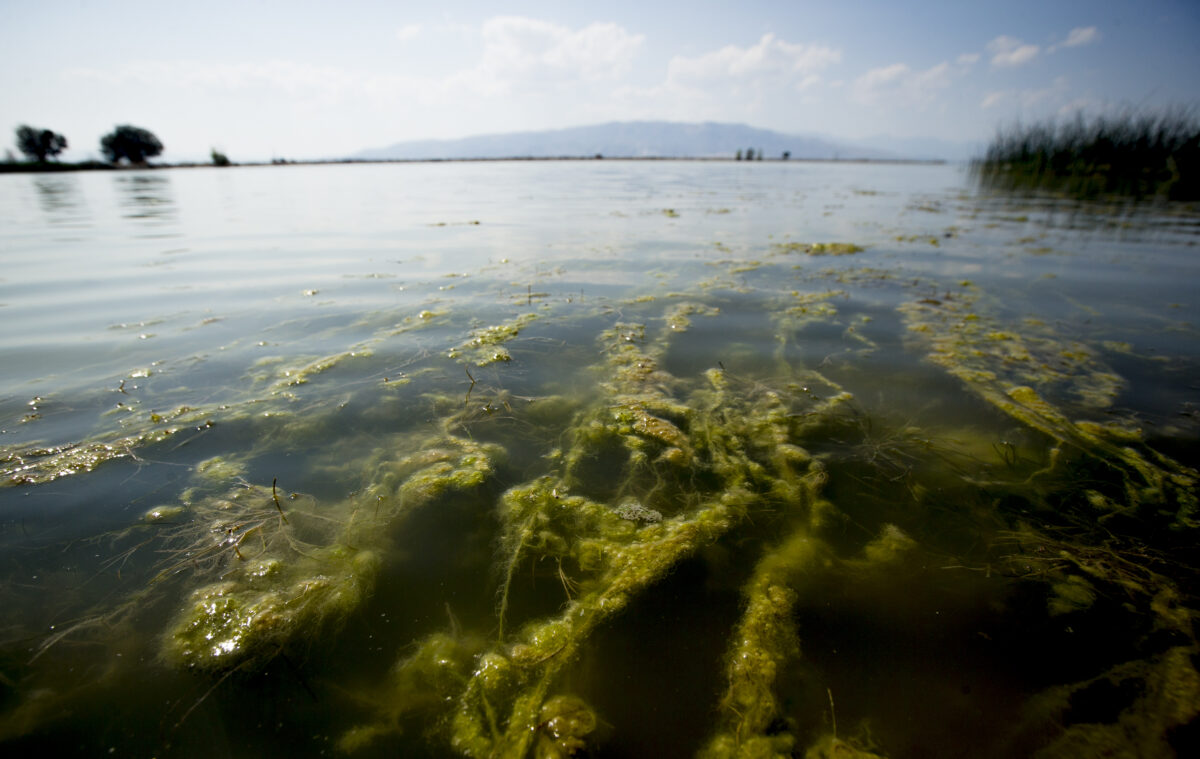Utah Lake Summit provides insight on body’s future

Ashtyn Asay, Daily Herald
BYU Associate Professor Ben Abbott presents at the Utah Lake Summit on Tuesday, Jan. 11, 2021.
On Tuesday, interested people were physically in the Utah Valley University Science Building auditorium, but their minds were at Utah Lake.
The Utah Lake Summit brought together individuals with radically different ideas on what would be best for the centerpiece of Utah County.
The summit was hosted jointly by Conserve Utah Valley and Rep. Keven Stratton, R-Orem, and featured presentations from local scientists, public officials and representatives from the Utah Lake Restoration Project.
The Utah Lake Restoration Project is a proposal created by Lake Restoration Solutions, which suggests that dredging Utah Lake and creating man-made islands with the dredged sediment, that they claim would make the lake deeper and healthier.
The project has received fierce opposition from local conservation groups. Several Utah County cities surrounding Utah Lake, including Provo and American Fork, have also passed resolutions asking the state legislature to increase environmental protections for the lake during the 2022 Legislative General Session in response to the project.

Isaac Hale, Daily Herald file photo
Algae floats in the water at Utah Lake State Park in Provo on Friday, Aug. 28, 2020.
Stratton and Craig Christensen, director of Conserve Utah Valley, gave an introduction at the summit, stating that their goal was to engage in a civil, respectful, and transparent discussion.
“I don’t believe for a second my way is the right way, I just want to be heard,” Christensen said. “It’s not my way or the highway.”
“I love the word transparency… that’s how we’re going to get to where we want to be,” Stratton added.
Ben Abbott, an associate professor of aquatic ecology at Brigham Young University, presented a timeline of Utah Lake, from the time indigenous peoples first utilized the area to the present day.
Abbott presented a wealth of research indicating that Utah Lake has been healing and improving in recent years. He stated that the lake is resilient, and that resiliency will continue if the lake is left relatively undisturbed.
“There’s widespread misunderstanding of what Utah Lake is,” Abbott said.
The panel entitled “Water Quality and Algal Blooms” discussed what is currently being done to treat Utah Lake’s algal blooms, as well as the importance of choosing academic, peer-reviewed sources when you research information to influence your decisions and opinions.
“Anything that’s done in secret, or is not transparent, is probably not good data,” said Kevin Shurtleff, an associate professor of chemistry at Utah Valley University.
A panel entitled “Lake Perspectives” featured a discussion between Utah County Commissioner Bill Lee, CEO of the Utah Valley Chamber of Commerce Curtis Blair, Utah Lake Commission member Eric Ellis, Utah Lake Restoration Project Spokesperson Jeff Hartley, and President and COO of the Utah Lake Restoration Project Jon Benson.
The panel was moderated by Executive Director of the Hutchings Museum-Institute Daniela Larsen, who first asked the panel members about the National Environmental Policy Act process.
Before Lake Restoration can take any action, the Utah Lake Restoration Project is required to go through the NEPA process, where it will be thoroughly investigated and its possible environmental impact on Utah Lake will be examined. Lake Restoration Solutions filed their application to begin the NEPA process earlier this month, but the full process will take years.
According to Benson, hundreds of pages of data supporting the Utah Lake Restoration Project, as well as cited sources, were included in the project’s NEPA application. This information is not yet public, however, Benson stated that once the U.S. Army Corps of Engineers has deemed the Utah Lake Restoration NEPA application complete — expected to be within the month — it will be released to the public.
“There’s some time here to figure this out and get this right,” Benson said. “We’re team Utah Lake, and we invite you all to join that team.”
The Lake Perspectives panel was ultimately ended early after an active round of audience questions.
Stratton gave a presentation entitled “Just the Facts: Water and Legislature” where he discussed the legality of the restoration proposals made during the summit, and the bill file he opened to examine potential amendments to H.B. 272.
- BYU Associate Professor Ben Abbott presents at the Utah Lake Summit on Tuesday, Jan. 11, 2021.
- Algae floats in the water at Utah Lake State Park in Provo on Friday, Aug. 28, 2020.





